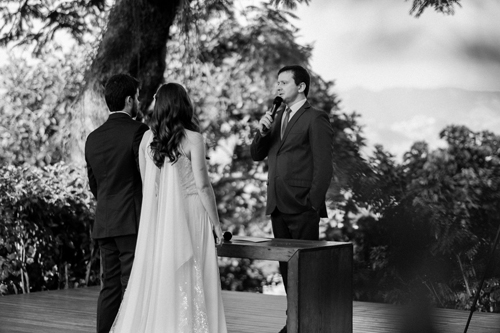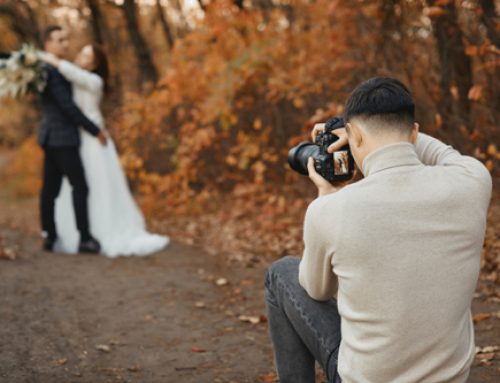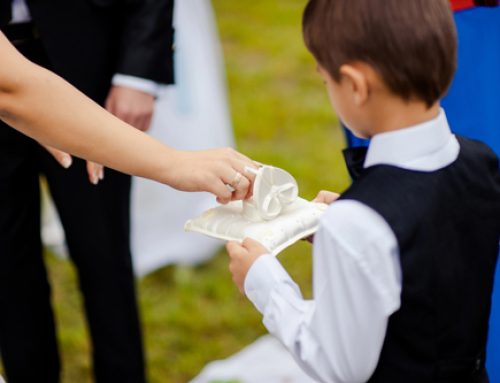When planning a wedding, one of the most important decisions you make is choosing a wedding officiant. Your officiant conducts the marriage ceremony, offering opening remarks, guiding the couple through the vows, and sealing the union by signing the marriage certificate. Depending on the nature of your wedding, officiants can also handle responsibilities like running a rehearsal and planning the ceremony itself.
All couples have the freedom to choose their own wedding officiant. Many choose a religious leader in the community, or someone with a special role in their lives. It’s important to consider factors like your preferred wedding style, overall costs, and a personal connection to a potential officiant before selecting one.

What Is a Wedding Officiant?
A wedding officiant is the officially recognized leader of a wedding ceremony. They are selected by the couple to emcee the day’s events, including the exchange of vows. Officiants also sign the marriage certificate to legally seal the union.
The role of a wedding officiant begins far before the wedding day. They typically meet with the couple during the planning process, taking notes on their vision for the ceremony. Officiants will discuss the couple’s background and values to create a personalized order of events. They also arrange all paperwork to make the marriage legally binding.
On the day of the ceremony, wedding officiants guide the couple — and all participants — through the ceremony. This includes a general introduction, mid-ceremony homily or address, and the exchange of vows.
Who Can Officiate a Wedding?
Most states acknowledge two types of wedding officiants: religious and civil. Religious officiants include priests, ministers, pastors, rabbis, and other leaders in native religious communities. A civil officiant like a judge, city clerk, or professional officiant can also facilitate your ceremony.
The nature of your officiant will likely affect the wedding itself. For example, religious officiants typically conduct ceremonies that include prayers, rituals, and readings. Civil ceremonies don’t always include these elements, though the couple can sometimes choose to incorporate them.
The requirements for a wedding officiant can vary from state to state. It’s important to consult your state’s regulations when selecting your officiant to confirm that they meet all legal conditions. These requirements might include the specifics of their ordination, legal documentation, and/or place of residence.
Can You Officiate Your Own Wedding?
Self-solemnization is an unconventional approach to marriage, one where the couple officiates their own union. The ceremony takes place without an officiant. Instead, the couple declares their personal union directly to one another, mutually acknowledging their commitment during their vows.
While this concept might sound appealing, it’s important to note that most U.S. states still require a wedding officiant for a valid ceremony. Nine states recognize this form of self-uniting marriage. Currently, you can officiate your own wedding in California, Colorado, Illinois, Kansas, Maine, Montana, Nevada, Pennsylvania, and Wisconsin — plus Washington D.C.
How Much Does a Wedding Officiant Cost?
The cost of a wedding officiant can vary widely. Many religious officiants only request a donation or small fee to perform the ceremony. By contrast, some professional officiants who specialize in personalized weddings will have higher rates.
Here are a few factors that can influence the cost of a wedding officiant:
- Wedding location: The geographic area of your wedding can affect costs. Wedding officiants in larger cities or high-demand areas will charge more for their services.
- Specific services: Services like advanced wedding planning, vow writing assistance, and rehearsal attendance can sometimes increase a wedding officiant’s fees.
- Officiant type: Religious leaders, professional officiants, and civil service providers will all offer different fee structures.
- Season: The time of the year can also impact pricing. Officiants likely charge more during peak wedding season, which is typically early summer through mid-fall.
If the cost of a wedding officiant sounds intimidating, there are several ways to control your expenses. For example, couples can choose a less expensive venue or schedule their marriage during a less busy time of the year for officiants. They can also choose to have a family member or close friend officiate the wedding, and settle on a private payment amount with them.
What Does the Officiant Say?
A wedding officiant is responsible for most of the spoken words during a marriage ceremony. However, couples can largely decide what their officiant will say, particularly during a civil ceremony.
Here are a few major areas of a wedding where an officiant will speak:
- Introductory address: Welcoming guests, thanking them for their attendance, emphasizing the importance of the day for the couple.
- Readings: Performing a reading from a poem or religious passage or introducing a guest to perform the reading.
- Declaration of intent: Asking each partner to confirm their intention to marry the other.
- Exchange of vows: Prompting the couple to exchange vows and exchange rings.
- Pronouncement of marriage: Declaring the couple formally married and often inviting that couple to seal their new union with a kiss.
- Closing remarks: Concluding the ceremony with a final word of encouragement and congratulations.
After the ceremony itself, an officiant might also explain next steps to those in attendance. This address might include instructions for post-ceremony pictures and driving or walking directions to a post-ceremony reception.
The Role of Rings in Wedding Speeches
The wedding ring is an iconic symbol of marriage, one with deep importance in most wedding ceremonies. The circular, unending band is meant to symbolize the unending nature of a couple’s union. Rings play an important role in a wedding ceremony — and often become a pivotal speaking point in a wedding officiant’s address.
The exchange of rings is an important part of most wedding ceremonies. Many officiants incorporate this event as a main feature of the wedding. Religious officiants may bless the rings, while civil officiants often explain the importance of the rings as a symbol of love, admiration, and sacrifice.
Couples are free to choose rings that match their preferred style. Men often prefer a thicker band with domed, polished, or carbon fiber features. Tungsten makes for a polished, professional women’s ring as well — brushed or polished metal that holds its look over the years. It’s important to choose a ring thickness, appearance, and polish that matches your preferences, whether you’re seeking a matte finish or carbon fiber inlay.
Popping the Question: Asking Someone to Officiate Your Wedding
Asking someone to officiate your wedding is an important moment, both for the couple and the potential officiant. This moment often recognizes someone’s value in your life, particularly if you choose a family member or close friend to officiate.
There are several ways to make this moment special for you and your preferred officiant. Consider personalizing your invitation with flowers or a personal gift. Add a handwritten note that explains why you’ve chosen them to oversee your special day.
If you don’t already know your officiant, make sure to spend time with them as a couple before your wedding day. This helps create a special bond between officiant and both partners, making your union even more meaningful.




Leave A Comment